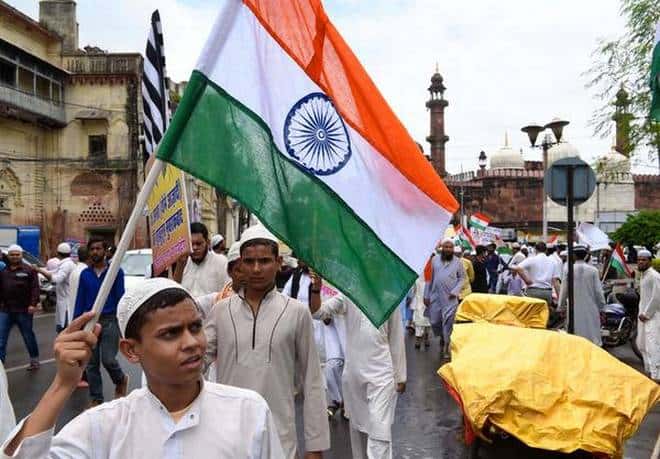Known for opposing the demand for Pakistan, Jamiat Ulema-e-Hind marks 100 years since inception
A century ago, a Muslim organisation was set up to pursue two broad goals: freedom for India and the restoration of the Muslim Caliphate after Turkey’s defeat in the First World War.
Cut to the present, when the Jamiat Ulema-e-Hind is observing its 100th anniversary, and the organisation has emerged as a voice for Muslim causes in independent India.
It famously espoused a composite nationalism for India, opposed the Muslim League’s demand for Pakistan and took part in the freedom struggle. And it was in the news in 2008 for getting the Islamic seminary Dar-ul-Uloom at Deoband to pass a fatwa declaring terrorism as un-Islamic. The Jamiat has had a close association with the famous Islamic seminary at Deoband.
However, this eminent group of “nationalist Muslims” has been struggling to come to terms with criticism from within: the recent Pasmanda Muslim claim that it did not take up the issue of caste differentiation among Indian Muslims.
“We have always stood for India’s composite culture and pluralism. We fought the British right from our birth, took part in the Gandhian movement, and opposed the two-nation theory promoted by the Muslim League,” says Jamiat Ulema-e-Hind secretary Maulana Niaz Ahmed Farooqui, as he reminisces about the history of the organisation.
No to two-nation theory
The Jamiat’s most notable contributions included a critique of the two-nation theory in the 1930s and 1940s.
In 1938, when the idea of a separate homeland for Muslims had already been conceived, came a landmark book by Deobandi Muslim scholar Maulana Hussain Ahmad Madani, who was a leading light of the Jamiat.
Titled Muttahida-e-Qaumiyat (united/composite nationalism), the book argued that the Indian nation could not be based on religion, and that India was a single nation with a composite culture.
But Maulana Madani’s book wasn’t simply a critique of separatism; it was an integral part of the Jamiat worldview since its inception in 1919. And the 100-year-old organisation says it sticks to its core worldview.
Just before Partition, another Jamiat and Deoband scholar Maulana Irz ur Rehman Seohaarvi wrote Tehreek-e-Pakistan Par Ek Nazar, where he stringently criticised the demand for Pakistan from Mohammad Ali Jinnah’s Muslim League as “dangerous”, Aligarh Muslim University (AMU) historian Mohammad Sajjad told The Hindu.
“As late as 1945-46, when the Congress, too, had reconciled to Pakistan, the Jamiat Ulema-e-Hind never accepted the idea. This is the most notable aspect of its history,” says Prof. Sajjad.
This, then, is at the heart of the Jamiat’s contribution to the idea of India.
A deep divide
In The Destiny of Indian Muslims, Syed Abid Husain captures the split among Indian Muslims in the 1936-1947 period.
Two views emerged: one, that freedom should not be linked to special rights for educated and propertied Muslims and that the community should join the anti-colonial struggle; and the other that independence and transfer of power would be dangerous unless the question of special rights of Muslims was settled.
While the Muslim League veered around to the second position and drifted away from the Congress by the 1940s, the Jamiat stood with the freedom struggle. And as the Muslim League position came to dominate the AMU, the Jamiat and Aligarh were never on the same page.
Post-independence, the Jamiat worked to inject confidence among Indian Muslims, says Prof. Sajjad. They took up the cause of Urdu, the need to protect Muslim personal laws as “integral” to Muslim religio-cultural identity and worked to spread education among Muslims, running schools, colleges and madrasas.
However, a Pasmanda Muslim critique of the Jamiat’s purportedly Ashraf (upper caste/class) moorings is increasingly audible, as the question of caste becomes crucial among Indian Muslims.
Saharanpur-based activist and academic Khalid Anis Ansari, a doctoral fellow working on caste movements among Indian Muslims at the University of Humanistic Studies (UvH) in Utretcht in the Netherlands, says the Jamiat, being Ashraf-dominated, has steered clear of taking a progressive line on social reform.
Not a monolith
“Be it the question of low caste Muslims or Muslim women, they have chosen to ignore their exclusion and spoken as if Indian Muslims are a monolith,” he told The Hindu. “Dominated by upper caste, Muslim men from north India, the Jamiat took a conservative position on the recent debate on instant triple talaq.”
Mr. Ansari claims that the differences between the Muslim League and the Jamiat were more of a strategic character, as none of them truly transcended religion but accepted its deeper centrality to life.
Indeed, the Jamiat Ulema-e-Hind did stand with the All India Muslim Personal Law Board’s position on the question of instant triple talaq, contending that Islamic law is necessary for Muslims. Maulana Farooqui says Muslim religio-cultural identity in India needs preservation as an explanation for the organisation’s position.
Courtesy: the hindu
http://www.thehindu.com/news/national/century-not-out-jamiat-still-bats-for-an-india-with-a-composite-culture/article24242019.ece

